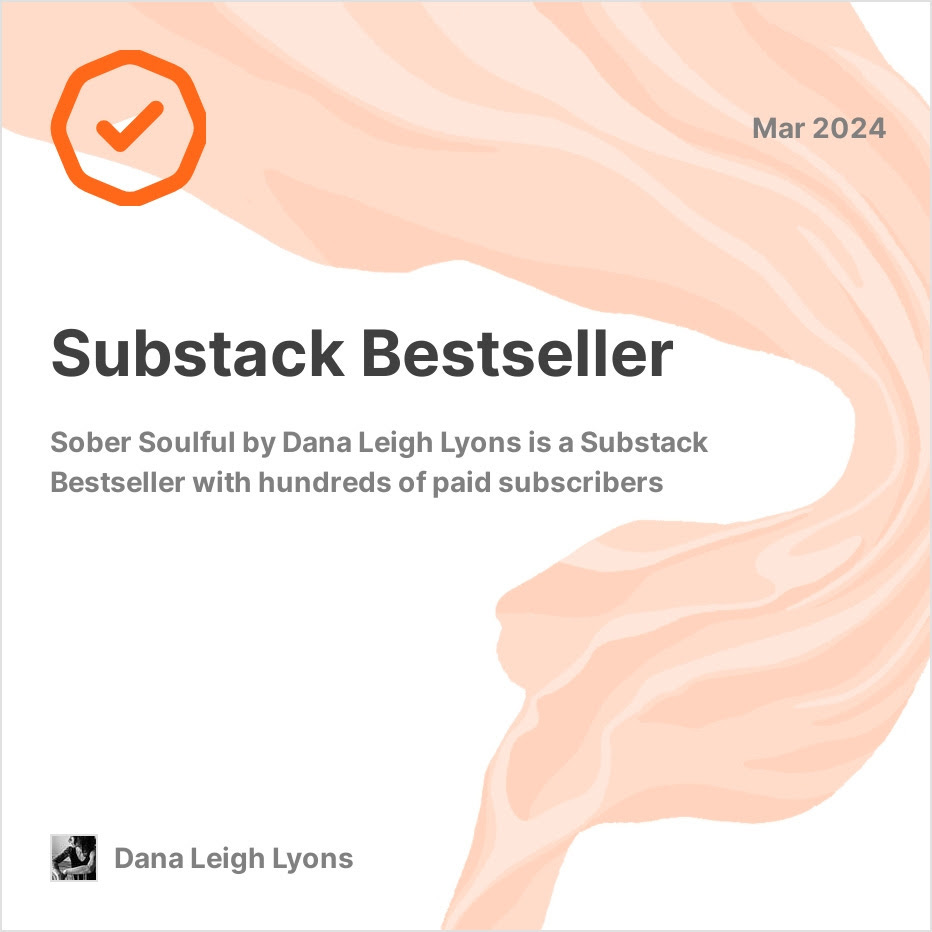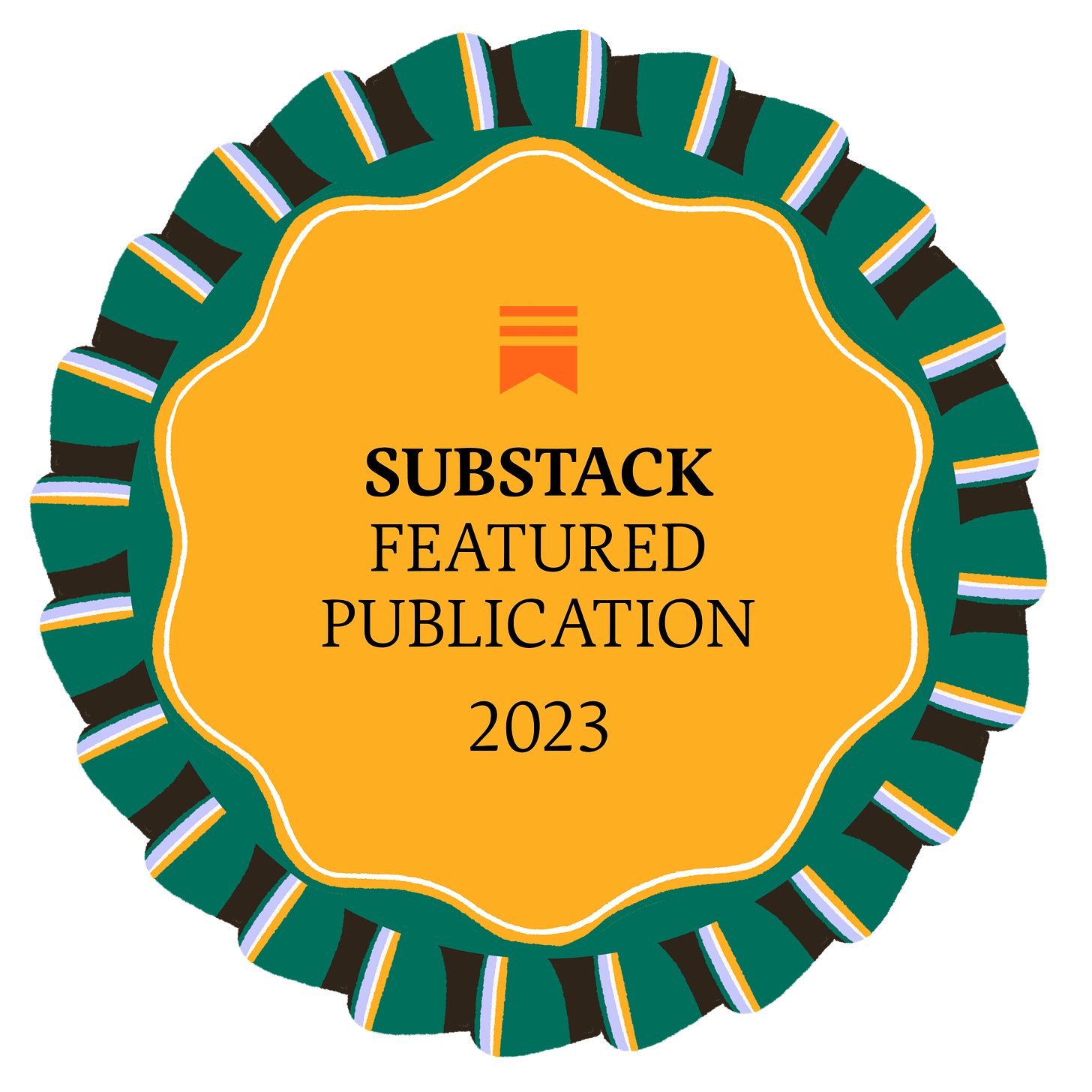👁️ Holistic Eye Health: Insights from Traditional Chinese Medicine
The Practice Vision Edition – Part 1
The Practice is a regular series delivering holistic, heart-sourced guidance on body-mind-spirit wellness. You can upgrade your subscription for full access here:
Dearest Reader,
This is Part 1 of a three-part exploration into simple, natural ways to support our eye health. But first, let me take you on a little journey—from smugness, to denial, to dismay… to squinting in the dark with a torchlight, trying to feel my way out.
Until my mid-40s, my vision was perfect. I was both surprised and a little smug about this, considering it defied both my family history and what an optometrist friend told me three decades ago: “Everyone needs glasses by 40.”
No, they don’t—not me. Through my early 40s, my eyesight remained crystal clear. Despite my genetics. Despite not taking medications or supplements. Despite not doing anything special, really, other than supporting my overall wellness with everyday habits—mainly yoga, meditation, and a nourishing diet.
Enter 2020. I was teaching college, then became the dean of a large program, and soon found myself in one of my most overworked, anxiety-ridden stretches in memory. Between lockdowns and teaching and dean’ing online, my screen time went full-on dystopian. So did my stress.
Eventually, I made the difficult decision to leave academia. But somewhere in the midst of it all, my near vision plummeted (thankfully, my distance vision held steady). First came denial (I’m just tired!). Then, dismay (Why can’t I read novels at night anymore?). Finally, surrender: I got my first pair of glasses (Whoa, what is this sorcery?!).
If you’ve been putting off getting glasses like I did, here’s my take: I wish I hadn’t waited so long. They’ve truly been life-changing. However…
I’ve also noticed something interesting: when we start relying on tools to do what our bodies once did naturally, things tend to shift. Our bodies are master compensators, constantly reallocating resources where they’re most needed. I can’t help but wonder if reaching for my glasses every time my vision blurs has become part of the reason my eyesight is weaker.
And look—it’s not either/or. For me, it’s been about using the help I need and supporting my eyes’ natural capacity. Because vision isn’t static. Even over the course of a day, week, or month, it fluctuates. And how we care for our eyes—and our bodies as a whole—absolutely makes a big difference.
In this three-part series, I’ll share what this looks like for me—including practices I’ve been doing for a while, along with newer ones I’ve recently added. I’ll also draw from my background and clinical practice as a Doctor of Traditional Chinese Medicine. While a couple of things I do personally involve costs (acupuncture and herbal medicine, primarily), everything else is low-cost or free.
As with the rest of The Practice, this latest series reflects my minimalist, accessible approach to taking care of ourselves and our loved ones. We don’t need to overcomplicate or over-commodify everyday wellness.
A note on my qualifications & an advice disclaimer: In addition to completing a five-year Doctor of Traditional Chinese Medicine program and passing licensing board exams in both the United States and Canada, I pursued additional training in ancestral health and nutrition to become a Certified Primal Health Coach. I also developed the curriculum for and taught in the inaugural Holistic Nutrition Program at Kootenay Columbia College of Integrative Health Sciences. Additionally, I served as an instructor and Dean of Acupuncture & Chinese Medicine at Pacific Rim College, home to one of the largest Chinese Medicine programs in North America.
As a licensed healthcare professional, I cannot give individual-specific medical or dietary advice without conducting a full intake and having the client sign consent and privacy waivers. While what follows may feel like good medicine, it’s not prescriptive or medical advice.
Part 1 (today!) shares insights from Traditional Chinese Medicine and covers the basics:
How the eyes connect not just with the physical body, but also with the mind, spirit, and consciousness
How to support eye health through diet and lifestyle essentials
What to consider when taking Chinese herbs or working with a TCM practitioner (whether for eye health or anything else)
Then, in Part 2, I’ll break down common patterns in Chinese Medicine diagnosis, including:
Key signs and symptoms (so you can try to spot your own pattern, if you’d like)
Pattern-specific diet and lifestyle tips
Simple teas to support eye health (These are easy to brew at home, not product or affiliate links.)
Finally, Part 3 will explore functional biomedicine and neuroscience-backed strategies to protect and strengthen vision—including quick, easy practices.
This series is a starting point for rethinking eye health and overall wellness—and how to weave holistic eye care into everyday life.
Today’s Part 1 is free; Parts 2 and 3 are exclusive to paying subscribers. You can upgrade for full access to this series, The Practice, and everything else at PERFECT HUNGER here:
The Eyes (and Caring for Them) According to Traditional Chinese Medicine
In Traditional Chinese Medicine, the eyes are far more than a physical sense organ—they reflect the shen (神), our heart-mind-spirit. Think of shen as the sum of our mental, emotional, and spiritual vitality. When it’s bright, our eyes are clear, sparkly, and fully present. But when we’re exhausted, emotionally drained, or out of balance, that light grows dim.
This might sound esoteric or quaint, but stay with me. Consider the bright-eyed wonder of a child versus the dullness that creeps in after too many sleepless nights, endless screen time, or the numbing effects of alcohol, certain medications, or a diet heavy in fast food or sugar.
I don’t know about you, but when my eyes are tired and dull, I feel it in my work and relationships, too. It’s like peering through a fogged pane of glass—being present, connecting, and even thinking takes a whole lot more effort.
Our eyes tell a story—one that goes far beyond vision.
This is where Chinese Medicine comes in. It sees beyond symptoms to the whole picture—how your body, mind, and spirit comprise a whole… and how every part of your life shapes your well-being.
In Chinese Medicine, we use shorthand to describe complex relationships. For example, when we speak of the Liver, Heart, or Kidneys (capitalized to distinguish them from their physical counterparts), we’re referring to entire systems—each with its own web of physical, emotional, and energetic connections.
The Liver, for example, ensures the smooth flow of Qi, Blood, and emotions—and it’s closely linked to the eyes. Not only in the biomedical sense, but also through its role in nourishing vision and maintaining clarity, both physically and mentally. When Liver Qi or Blood is stagnant or deficient, the eyes often show it.
The Heart governs shen—our consciousness and mental clarity, reflected in the eyes. The Kidneys store jing, or vital essence, which is the most foundational, structural aspect of a person and declines with age (one reason vision changes as we grow older).
The Heart, Liver, and Kidneys—along with our other organ systems and overall vitality—suffer when we chronically overdo or underdo certain things. In TCM terms, we view the consequences in terms of excess and deficiency. A few common culprits:
Sleep deprivation or poor sleep
Sedentary habits or overexercising
Chronic stress, rumination, and worry
Excessive screen time
Lack of nutrients or overeating (all foods or certain foods)
Regular use of alcohol or other drugs (including some popular pharmaceuticals)
What you might call a “rock-and-roll” lifestyle (or “messy-edgy-chaotic-feral-cool,” depending on your generation 😎).
When one system falters, the others ripple with effects. And as these systems become imbalanced—whether from aging, life events, stress, excess screen time, poor diet, lack of movement, or emotional turbulence—our eyes lose their sparkle. You might notice:
A dull, distant gaze (as if the spirit itself is retreating)
Vision changes (near or far)
Dryness, redness, or excessive tearing
Floaters, light sensitivity, or poor night vision
More serious conditions like glaucoma or cataracts
But here’s the hopeful part: many factors are within our control. Just as lifestyle can dim our eyes, it can also bring back their sparkle. Proper rest, nourishing foods, balanced movement, and emotional care all help revive the shen ming (神明)—our “spirit brightness.”
Great! So you have acupuncture and herbs for that, right?
Okay, here’s the deal. The specifics of what’s going on in our eyes—both the condition itself and how it’s showing up for a particular person—constitute an entire area of Chinese Medicine study and treatment.
In the five-year program where I completed my DTCM studies, we had a semester-long, advanced-level course devoted to diagnosing and treating diseases of the eyes, ears, nose, and throat with herbal formulas (on top of covering the sense organs in other courses, too). That still only scratched the surface, and TCM doctors could easily build a clinical practice focused on eye disease.
All to say: I’m keeping things super simple here. But don’t mistake that for lack of sophistication and depth in the medicine. And if you can swing regular visits with a TCM doctor, you might want to try it. We don’t just treat symptoms—we look at everything (and how it’s connected).
Here in Thailand, where care costs much less than in Canada or the States, I get acupuncture weekly to monthly. When I go, I request extra needles around my eyes—both to support my vision and for the subtle cosmetic effects. I also take a Chinese herbal formula that benefits my eyes in addition to addressing perimenopausal symptoms like insomnia, feeling overheated, dry skin, and mood swings.
If you’re interested in Chinese herbs, I strongly recommend finding a licensed practitioner who has completed a full Doctor of Traditional Chinese Medicine program, which typically involves at least five years of formal study and clinical training at an accredited college. This is far more extensive and very different from the 2-3-year programs required to become a licensed acupuncturist (which include minimal or no herbal training and cover a much narrower scope of practice).
As a licensed Traditional Chinese Medicine doctor, I don’t give one-size-fits-all herbal advice. TCM is nuanced, and how we treat the eyes depends on what’s happening in the whole body. Prescribing safely and effectively requires a full medical intake, including a review of any pharmaceutical or recreational drug use to assess for potential interactions.
We also rarely prescribe single herbs. In TCM, the synergy between herbs is essential to both safety and effectiveness, which is why we rely on time-tested formulas—carefully crafted combinations designed to work together in specific ways.
That said, Part 2 of this series will share some herbs you can brew as simple teas, along with specific foods TCM recommends for eye health. This falls under yang sheng fa (“nourishing life principles”), the branch of TCM covering diet and lifestyle. Don’t underestimate it! Our classics say food and lifestyle come first, even before acupuncture, herbal formulas, and other treatment modalities.
5 Everyday Habits That Brighten Your Vision
Before we get more granular and pattern-specific in Part 2, let’s start with the truth—even if it’s not always popular. The most powerful ways to support your eyes are the fundamental habits we all know about… but sometimes let slide.
Yes, I’m talking about the basics: eating nutrient-dense foods, minimizing or avoiding what’s harmful, moving our bodies each day without overdoing it, prioritizing sleep, spending time outdoors, and reducing screen time.
These practices will do more for your eye health and overall well-being than any acupuncture treatment, herbal formula, tea, or supplement. I emphasize this often in this newsletter because:
I’ve witnessed the transformative power of supportive habits—both in my life and with patients. No medicine can compensate for what we do (or don’t do) every day.
The wellness industry is full of quick fixes that promise miracles but can’t replace fundamentals.
I understand the allure of those shiny solutions. Some might help, but they’re not the foundation. You can’t buy or biohack your way out of chronic exhaustion or an unhelpful diet. The real magic comes from implementing the “boring” basics consistently, over the course of months, years, and decades.
That reality check in mind, here are Chinese Medicine’s essentials for eye health:
1. Get good sleep.
Notice how even one poor night’s sleep affects your vision? That impact compounds over time. In Chinese Medicine, quality sleep nourishes your shen, Heart, Liver, Kidneys, and everything else in body-mind-spirit. Find my top tips for getting better zzz’s here.
2. Eat nourishing foods.
At its core, this means prioritizing real, whole food—including meat, fish, eggs, veggies, fruits, and healthy fats (e.g., grassfed butter or ghee, coconut oil, extra virgin olive oil, avocado oil). For specifics on how I personally eat (and what I recommend to patients), find my 5 food “rules” for feeling better here and check out Part 3 of my series on Quieting Food Noise (Without Ozempic) here.
Worth noting: TCM usually doesn’t recommend strict vegan or even vegetarian diets, especially for older, weaker, or depleted individuals struggling with chronic health conditions. A few signs you might benefit from incorporating high-quality animal products into your diet:
Vision issues (blurriness, floaters, declining vision, degenerative conditions)
Constant fatigue or low energy
Brain fog or difficulty concentrating
Poor memory
Frequent illnesses or injuries
Physical weakness
Slow wound healing
Neurological issues
Chronic insomnia, mental-emotional depression, and worry
Menstrual irregularities, especially scant periods or amenorrhea
Low libido
Fun fact: it’s common for people to enter a DTCM program as vegetarians and start eating animal products by the time they graduate. I’m a living example—after ten years as a vegetarian/vegan, I was eating meat, fish, and eggs by the end of my studies. The older I get, the more vital this shift feels for my physical health and mental well-being.
3. Avoid foods and substances that deplete your energy.
Cut back on anything that contributes to sluggishness, dullness, or a weighed-down feeling (whether in the moment or afterwards). Common culprits:
Alcohol and other drugs
Highly processed foods
Excess sugar and grain-based carbs
Overeating to the point of discomfort
Excess caffeine and other stimulants (When we consume stimulants, we’re borrowing from future resources—sometimes with astronomical interest. Energy doesn’t come from nowhere, and eventually, the body collects.)
4. Move naturally throughout your day.
Forget the “10-minute abs then sit” approach. In Chinese Medicine, movement:
Keeps your Liver happy and Qi flowing
Helps process stress and emotional knots
Is even more impactful when done outdoors (the Liver thrives around greenery)
If you already have a workout routine, that’s fantastic—just be mindful not to overtax yourself, which has diminishing returns. But beyond formal exercise, consider weaving small movements throughout your day: a brief walk after meals, stretches combined with deep breaths between work tasks, taking the stairs. These seemingly minor choices and actions create a foundation of continuous movement—helping to keep your spirit and eyes bright with vitality.
Psst: Moving your eyes around is essential too! If you spend lots of time online and/or wear glasses, this requires conscious, intentional effort. We’ll be looking at simple eye exercises in Part 3 of this series, but even taking movement breaks and getting outdoors works wonders.
5. Reduce stress and screen time.
Chronic stress, overwork, and excessive screen time take a heavy toll on the eyes. While eliminating these completely may not be realistic, we can do what we can to lessen their impact.
This is also where supporting yourself through diet, sleep, and movement becomes extra essential. These fundamentals are your baseline protection when life demands more from your eyes and your nervous system.
Yeah, but… tell me what Chinese Medicine teas to drink!
I get your enthusiasm! While we’re covering the essentials first (because they matter most), Part 2 of this series will dive into:
Common Chinese Medicine patterns behind eye issues
How to identify which might apply to you
Specific teas and yang sheng fa (diet and lifestyle) practices for each
For now, know this: everything we’ve covered today helps pretty much everyone. If your eyes feel strained, dull, or tired, start there.
I’m curious: What have you noticed about your own eyes over time? Please share in the comments!
Quick reminder: this is an unsolicited-advice-free zone. Please rest assured that anyone who offers you unasked-for opinions on your body, your health, and your choices will be removed from the comment section.
Parts 2 and 3 of this series will be for paying subscribers. Upgrade below to unlock the full series and support the heart of this work.
With love,
Dana














Thank you for this topic! I finally have time to read it. A couple months ago, my eyeglasses (I am nearsighted) broke and I haven't replaced them. At first the far distance was uncomfortably blurry, but I am dealing. I can't help but wonder if the Universe thought I didn't really need them in my new life. On to the next post!
This is COOL! Thank you